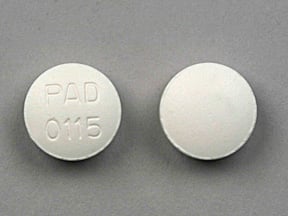
Flavoxate Coupons & Savings Card – Discount Prices from $47.27
Flavoxate is a medication designed to relieve specific bladder and urinary tract symptoms such as urinary urgency, frequent urination, bladder pain, and loss of bladder control. It functions as a smooth-muscle relaxant and antispasmodic, helping to ease muscle contractions in the bladder and urinary tract, thereby improving control over urination. While Flavoxate does not cure the underlying cause of urinary symptoms, such as infections, it can be used alongside antibiotics to manage discomfort associated with urinary and prostate infections. Always consult with a healthcare professional before starting any new medication.
Our coupons are free to use. Before paying, show the pharmacist your Flavoxate savings card to get your free discount. Use our filters below to edit the prescription box to match your needs. The Flavoxate prices will update based on your prescription needs. Above our Flavoxate coupons, you can change your location to see pharmacy prices and costs in other areas. We're here to help you buy Flavoxate at the lowest price with our prescription discount card.
My prescription
Edit
100MG, Flavoxate (90 Tablets)
Select pharmacy

CVS
$58.15
COUPON PRICE
Walgreens
$47.27
COUPON PRICE
Walmart
$51.70
COUPON PRICE
Albertsons
$81.04
COUPON PRICEFlavoxate savings card
Show this card to your pharmacist
Walgreens
$47.27
BIN
ID
PCN
GRP
015995
LHKPU670019
GDC
DR33
Powered by
Flavoxate is a medication designed to relieve specific bladder and urinary tract symptoms such as urinary urgency, frequent urination, bladder pain, and loss of bladder control. It functions as a smooth-muscle relaxant and antispasmodic, helping to ease muscle contractions in the bladder and urinary tract, thereby improving control over urination. While Flavoxate does not cure the underlying cause of urinary symptoms, such as infections, it can be used alongside antibiotics to manage discomfort associated with urinary and prostate infections. Always consult with a healthcare professional before starting any new medication.
Our coupons are free to use. Before paying, show the pharmacist your Flavoxate savings card to get your free discount. Use our filters below to edit the prescription box to match your needs. The Flavoxate prices will update based on your prescription needs. Above our Flavoxate coupons, you can change your location to see pharmacy prices and costs in other areas. We're here to help you buy Flavoxate at the lowest price with our prescription discount card.
Related muscarinic antagonists prescriptions
More prescriptions for overactive bladder
coupons from$18.18Save 61%
coupons from$36.00Save 65%
coupons from$4.58Save 87%
coupons from$7.29Save 80%
coupons from$116.20Save 62%
coupons from$509.18Save 78%
coupons from$18.18Save 61%
coupons from$39.80Save 63%
Related muscarinic antagonists prescriptions
Tolterodine Save -37%coupons from $39.80
Trospium Save 14%coupons from $45.70
Gelnique Save 97%coupons from $1.01
Vesicare Save 76%coupons from $27.95
Oxytrol Save 93%coupons from $661.75
Toviaz Save 81%coupons from $66.15
More prescriptions for overactive bladder
Ditropan Xl Save 61%coupons from $18.18
Tolterodine ER Save 65%coupons from $36.00
Oxytrol For Women Save 87%coupons from $4.58
Hyoscyamine Sulfate Save 80%coupons from $7.29
Oxybutynin Chloride Save 62%coupons from $116.20
Gemtesa Save 78%coupons from $509.18
Oxybutynin ER Save 61%coupons from $18.18
Tolterodine Save 63%coupons from $39.80
Flavoxate dosage forms
Use our Flavoxate 100MG coupon with prices from $51.70 for 90 Tablets. You can also use our Flavoxate 100MG coupon with prices from $3.05 for 1 Tablet. We have a Flavoxate 100MG coupon with prices from $29.83 for 50 Tablets. You can use our Flavoxate 100MG coupon with prices from $57.17 for 100 Tablets.
Dosage Quantity Price from Per unit 100MG 90 Tablets $51.70 $0.57 100MG 1 Tablet $3.05 $3.05 100MG 50 Tablets $29.83 $0.60 100MG 100 Tablets $57.17 $0.57
| Dosage | Quantity | Price from | Per unit |
|---|---|---|---|
| 100MG | 90 Tablets | $51.70 | $0.57 |
| 100MG | 1 Tablet | $3.05 | $3.05 |
| 100MG | 50 Tablets | $29.83 | $0.60 |
| 100MG | 100 Tablets | $57.17 | $0.57 |
Flavoxate Warnings
It is important to be aware of the potential risks and necessary precautions associated with the use of this medication. If you have any concerns or questions, please consult your healthcare provider.
- Vision Changes: This medication, Flavoxate, may lead to blurred vision and difficulty focusing. If you have a history of glaucoma, inform your healthcare provider, as Flavoxate might exacerbate this condition.
- Contraindications: Avoid using this medication if you have certain medical conditions, as it may pose significant health risks:
- Blockages in the gastrointestinal tract
- Gastrointestinal bleeding
- Nerve damage in the esophagus
- Blockages in the urinary tract Should you experience any adverse effects or have concerns about these conditions, it is crucial to seek medical advice promptly.
Flavoxate Side Effects
Common side effects:
- nausea
- vomiting
- dry mouth
- headache
- drowsiness
- dizziness
- blurred vision
- nervousness
Serious side effects:
- persistent nausea
- persistent vomiting
- persistent constipation
- confusion
- eye pain
- chest pain
- rapid or pounding heartbeat
- signs of infection like a persistent sore throat or fever
- difficult or painful urination
- rash
- itching
- swelling (particularly of the face, tongue, or throat)
- severe dizziness
- trouble breathing
Flavoxate Interactions
Interactions with high risk of serious adverse effects and should be avoided:
- Potassium Tablets/Capsules
- Pramlintide
- Amifampridine
- Bupropion
- Clozapine
- Donepezil
- Glucagon
- Glycopyrrolate
- Glycopyrronium Tosylate
- Methacholine
- Quetiapine
- Revefenacin
- Scopolamine
- Secretin Human
- Tiotropium
Interactions with moderate risk that may require dose adjustment, closer monitoring, or timing changes:
- Opioid pain relievers (e.g., codeine, hydrocodone)
- Alcohol
- Marijuana (cannabis)
- Drugs for sleep or anxiety (e.g., Alprazolam, Lorazepam, Zolpidem)
- Muscle relaxants (e.g., Carisoprodol, Cyclobenzaprine)
- Antihistamines (e.g., Cetirizine, diphenhydramine)
